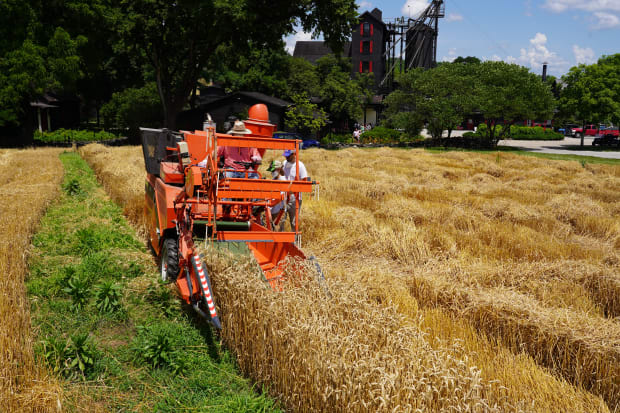The Loretto, KY, bourbon distiller is being recognized for its soil-management practices at Star Hill Farm with distinguished Regenified Verification.
Maker’s Mark first began practicing regenerative farming nearly a decade ago. It was committed to studying how flavor developed outside the distillery—what we now know as terroir.
“Ultimately, bourbon is nature,” says Rob Samuels, managing director and eighth-generation whiskey maker.
The team at Maker's Mark worked with local farmers, wheat-breeding experts, and soil scientists. They discovered regenerative farming not only allows nature to shine through for improved flavor in bourbon, but it also leads to a more sustainable future for the bourbon industry and environment as a whole.
Related: Bruichladdich Port Charlotte Islay Barley 2014 Takes Terroir to New Depths
Today, the regenerative efforts of Maker’s Mark have culminated in a Regenified certification, an acknowledgment of the regenerative farming efforts happening at its 1,100-acre Star Hill Farm. It lauds the brand as the first distillery in the world and first farm in Kentucky to achieve the verification.
What Is Certified Regenerative?
Regenified was founded in 2021 by regenerative farming veterans Gabe Brown and Dr. Allen Williams.
Their mission reads: “Regenified is a mark of confidence. It says you are holding a product that recognizes and rewards farmers and ranchers for their ongoing commitment to regenerative principles and practices to advance biodiversity, soil health, water quality and ecosystem resilience, all while maintaining harmony with nature.”
Conventional farming practices inhibit biodiversity, spur soil erosion, and increase water pollution with the widespread use of pesticides and synthetic fertilizers. It's led to a 38 percent decline in nutrients in fruits and vegetables over the past 50 years.
Regenerative farming has been adopted by farms around the world to reverse the effects. Practices include no-till farming, cover cropping (which Maker’s Mark follows), adaptive grazing, and livestock integration to improve soil health, remove carbon from the atmosphere, reverse climate change, and restore ecosystems.
Related: Meet the Organic Spirits Distillers Revolutionizing the Industry
The Regenified certification will lend credibility for the initiatives Maker's Mark believes in.
“It’s one thing for us to think we’re living these values and living these practices, but to have a third party validation was very important,” Samuels says.

Courtesy Image
Maker’s Mark's Regenified Certification Process
The Regenified certification process for Maker’s Mark began in the summer of 2022, when Maker’s Mark first contacted Regenified. Samuels explains the verification took place in October 2022 in-person: “They spent quality time onsite with our team in the fields and did soil samples that were benchmarked through their various processes,” he says.
The processes Samuels refers to are part of Regenified’s 6-3-4 Verification Standard to reflect on-farm and in-lab research on regenerative agricultural practices. The standard is laid out as a lengthy, tiered system that includes “six principles, three rules, and four processes to help farmers understand where their practices and lands are on the regenerative path,” reads the document.
Related: Whiskey Distilleries Where You Can Spend the Night
The certification is the latest in Maker’s Mark’s environmentally focused mission. In addition to this B Corp certification, the distillery is mapping the white oak genome with the University of Kentucky to preserve and protect the tree species for future generations (bourbon needs to be aged in charred oak, after all). It's also creating a natural water sanctuary to protect the watershed used to create Maker’s Mark distillery.
“Our ambition to act as a force for good in all that we do includes our commitment to being good stewards of the land and our soil at the homeplace of Maker’s Mark,” stresses Sameuls. “We know a commitment to the quality of our ingredients through regenerative agriculture can lead to a future where whisky is not only more sustainable, but markedly more flavorful as well.”
from Men's Journal https://ift.tt/m3aB2yt


0 comments